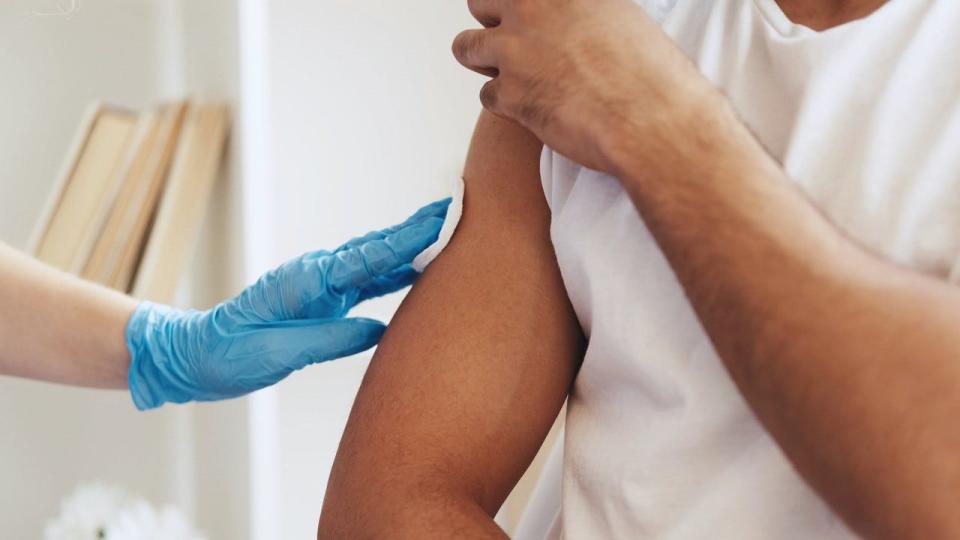COVID, flu and RSV: three viruses are expected to spread across Ohio this year
- Oops!Something went wrong.Please try again later.
Three viral infections are expected to be common across Ohio this year, and healthcare professionals are already urging patients to consider becoming inoculated against them over the next few weeks.
Respiratory syncytial virus (RSV), influenza (flu) and COVID-19 have already all made their presence known in the Buckeye State, according to Jill Hartson, the director of preparedness and prevention for the Ashland County Health Department.
It's only the start of an illness season that could linger until May.
That's why medical offices are beginning to stock up on RSV and flu shots and are eagerly awaiting the release of this year's updated COVID shots.

"It should be noted the safety risks of getting all three simultaneously hasn't been studied," Hartson said. "Individuals should discuss the risks and benefits with their doctor."
'We encourage October and November clinics'
The most effective window to receive a flu vaccination is October and November, according to Kate Siefert, health commissioner for Crawford County.
That allows patients to become inoculated "prior to holiday gatherings and not too early that the effectiveness wears off."
"Most flu boosters indicate their best effectiveness lasts about six months," Siefert said. "Flu season can go into April and May in Ohio, so we encourage October and November clinics so people are still covered while the flu is still spreading."
Even after they get a shot, everyone is urged to follow common hygiene practices, such as "frequent handwashing, covering coughs and sneezes, staying home when you are sick, avoiding others that are sick and keeping your commonly touched surfaces clean."
'There are new RSV prevention options'
Residents of the southeastern portions of the country have already entered their RSV season. The virus is expected to spread to the north and west over the next three months.
"There are new RSV prevention options, including vaccines to protect infants and young children at higher risk and older adults," Hartson said.
A new antibody called "Nirsevimab" is awaiting FDA approval and is expected to be available by October.
"Parents should talk to their pediatrician about the product," Hartson said. "It is available for infants less than eight months, and infants and children ages 8 to 19 months who are at increased risk of severe RSV."
Several COVID variants will circulate this fall
New variations of COVID have emerged throughout the world this year. Healthcare professionals will continue tracking EG.5, FL.1.5.1 and BA.2.86 this autumn.
The FDA is expected to approve the latest COVID vaccines and boosters this month. It is not yet known if those doses will be free and, if not, what percentage of the cost will be covered by insurances.
"The COVID-19 vaccine formula from last fall is still available and can be administered, but individuals may want to consider waiting for two reasons," Hartson said. "One, while we are in a current wave of COVID-19 infections now, historically, we have seen a higher wave in the winter and getting a vaccine closer to the winter wave may better prevent infection. Secondly, the updated vaccine formula may be more helpful against currently circulating variants."
'A crucial role in preventing outbreaks'
Vaccines do more than protect the person who received the shot, according to a Richland Public Health blog post published July 27.
"Vaccinations play a crucial role in preventing outbreaks in the community," the post reads. "When a significant percentage of the community is vaccinated, it decreases the spread of disease, helping to protect those who are unable to get vaccinated, like infants or people with immune system issues."
Vaccines have helped rid the world of dangerous diseases, such as smallpox.
"Vaccination programs continue to keep diseases like polio, measles and whooping cough under control," the post reads.
COVID masks debated by U.S. lawmakers
People who find themselves sick this year are asked to "wear a high-quality mask" if they must be around others.
Patients who contract COVID-19 are recommended to stay home in isolation for at least five days.
Any federal requirements, though, may not be possible if U.S. Sen. J.D. Vance (R-Ohio) gets his wish.
The new Buckeye lawmaker introduced his "Freedom to Breathe Act" last week, but the bill stalled on the Senate floor. On Friday, U.S. Rep. Marjorie Taylor Greene (R-Georgia) introduced the bill in Congress. It's fate is still undecided.
Vance wrote the bill to prohibit any federal official — including the president — from issuing mask mandates applying to domestic air travel, public transit systems, or primary, secondary and post-secondary schools, the senator explained in a news release.
The legislation would also prohibit air carriers, transit authorities and educational institutions from refusing service to individuals who choose not to wear a mask.
"We cannot repeat the anxiety, the stress and the nonstop panic of the last couple of years," Vance said. "That's what this legislation is about. End the mandates, end the panic, and let's get back to some common sense."
ztuggle@gannett.com
419-564-3508
This article originally appeared on Mansfield News Journal: Virus season is starting in Ohio and could linger for six months

